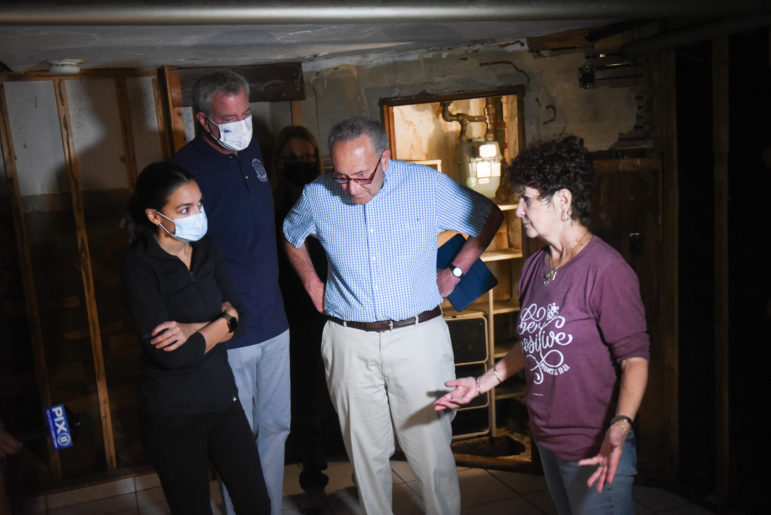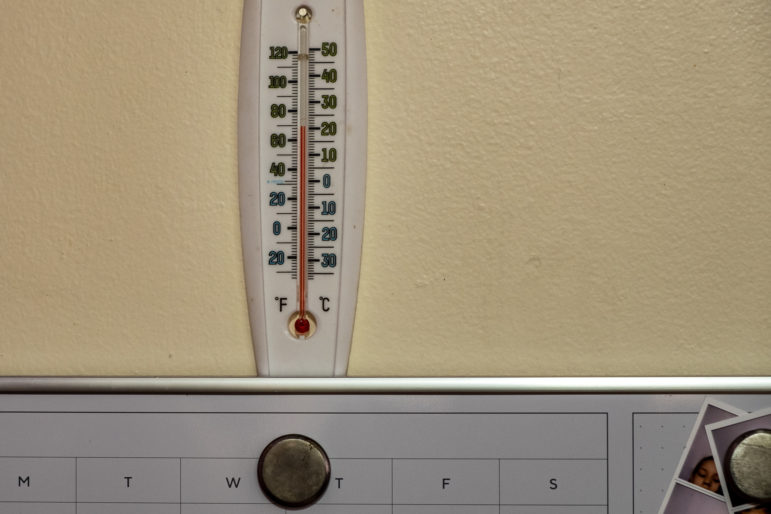‘In one of the most expensive housing markets in the country, people will continue to rent basement apartments whether they are legal or not. We need legalization to make them safe.’

Michael Appleton/Mayoral Photography Office
New York lawmakers tour flood-damaged homes following Hurricane Ida.Earlier this month, record setting rainfall from tropical storm Ida turned New York’s streets into rivers and rushed into subterranean apartments, drowning residents. Of the 13 New Yorkers who lost their lives in Hurricane Ida, at least 11 lived in basement apartments.
Many of New York’s basement apartments are illegally or informally rented because they don’t meet the city’s complex standards for legal occupancy. Estimates indicate that tens of thousands to hundreds of thousands of New Yorkers live in illegal basement or cellar units, which are unregulated and potentially unsafe. After these deaths, the city can’t afford to outlaw and ignore basement apartments; they should do the opposite: legalize and regulate more basement apartments to keep New Yorkers safe and create affordable housing.
In one of the most expensive housing markets in the country, people will continue to rent basement apartments whether they are legal or not. We need legalization to make them safe. New Yorkers choose potentially dangerous basement apartments because they can’t afford more expensive alternatives. New York’s rents have rebounded to a median $2,675/month after dipping through the peak of the COVID-19 crisis. They will continue to rise as market rate housing construction started off the year slow and affordable housing takes time to build.
Dangerous basements are a symptom of the larger housing crisis in New York where over 29 percent of households spend half their income on housing; 78 percent of extremely low income households, like families of four or more who make $35,790 or less, spend half their income or more on rent. With limited affordable units available, low-income tenants look elsewhere for housing, including illegal and dangerous basement units. Without these basement units, which fill a crucial hole in the low-income housing market, the outlook for low-income renters would be worse and more would experience homelessness.
 CityViews are readers’ opinions, not those of City Limits. Add your voice today!
CityViews are readers’ opinions, not those of City Limits. Add your voice today!
The city piloted a program in East New York to bring illegal apartments up to code, but the program had its budget slashed during COVID. Advocates say that current legalization efforts are focused on compliance, not meeting the needs of tenants and landlords. Some landlords don’t create legal units because of the onerous restrictions, high costs, and time consuming process of applying. Under the current system, legalization requires meeting specific zoning rules, unnecessary parking mandates, and highly specific unit dimensions. The current rules scare off basement apartment landlords, who are largely outer-borough homeowners who live above the units, not large corporate investors. Landlords in this situation fear piping up to legalize their basement units because they could lose their rental income or pay fines.
READ MORE: City’s Basement Apartment Program Buried by COVID-19 Budget Cuts
The risk to New Yorkers will only rise in the coming years. More frequent severe weather from climate change threatens more homes with flooding each year. Climate Central and the National Housing Trust estimate that the number of low-income homes at risk of flooding will triple by 2050, with New York among the states with the most units threatened.
Critics want to crack down on basement apartments they feel are unsafe and lead to overcrowding. But cracking down on basement apartments won’t stop people who have no other housing option. Some units may never be safely inhabitable. Others could become safer with retrofitting or additional safety measures. And by relaxing regulatory standards, safe apartments that don’t currently meet the city’s strict standards could be added to the affordable housing stock.
Legalization helps the city know which units are which. The city can change the burdensome legalization regulations, incentivize landlords with basement units to legalize them by making the process easier, fund basement conversion programs, and eliminate penalties for landlords who want to add their basements to the market.
If done right, legalization is a win-win. It will keep more New Yorkers safe and add needed, safe, affordable housing to the city’s stock. The city should act swiftly to make basement apartments legal or the consequences of the next storm could be worse.
Patrick Spauster is a housing researcher and Master’s of Urban Planning candidate at NYU Wagner.









4 thoughts on “Opinion: New York City Needs Basement Apartments Now More Than Ever”
It seems like city government is trying to shift the blame for their failures upon
The small homeowner who is basically trying to
To make ends meet The City has to face up to their policy failures as well as their negligence with respect to their failure to maintain and keep sewer from backing up or allow runoff to adequately be channeled away
If we have 100000 homeless and another 100000 in basement units albeit illegal
The real issue is the need to build at least 100000 more units The City needs to wake up and open up the artificially imposed restrictions and make this process happen In this emergency there iis no reason to have insane setbacks ie R5 Zones or areas where you can’t build buildings 0f at least 4 or 5 stories
And it would be nice if the building department would be more user friendly
And less bureaucratic we have an emergency reduce the constraints
And worry less about wether the units will be affordable you need to house 200000 people let the units be built at least the city will have the apartments to house people and then all they have to do is belly up to the bar and pay
NYC has a population of approx 8.8 million people. Our infrastructure is maxed out. That is what caused a lot of the flooding during Ida. The NYCDEP has a $1.53B budget. My water/sewer bills go up every year. Just what is the NYCDEP doing with all this money???
https://www1.nyc.gov/site/omb/publications/agency-budgets-projections.page?projection=826
NYC needs to downzone immediately. All these planned high-rise apartments buildings are only going to add to and eventually break NYC’s old water/sewer systems. 8.8 million people are enough! Legalizing basement apartments is a bad idea too. To do it safely and correctly is very expensive.
I hear ‘ya. Residents in the Throggs Neck section of the Bronx are fighting a rezoning proposal to allow erection of two or three high apartment hi rises, in a area where single family homes dominate. Not only would it add to traffic congestion but sewer and water lines would need to be upgraded as well. And I believe the developers wouldn’t shell out a dime for these upgrades.
Nice proposal but it must be accompanied with upgrading and extending existing public transportation systems that serves — or doesn’t serve — those neighborhoods where these basement apartments are located. Sewer and water lines must be beefed up as well.